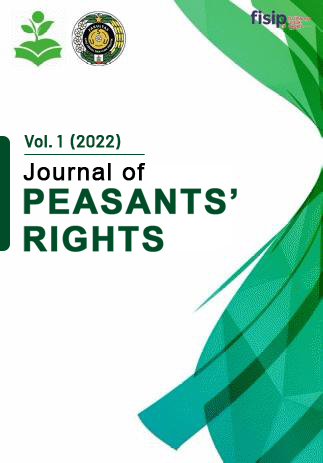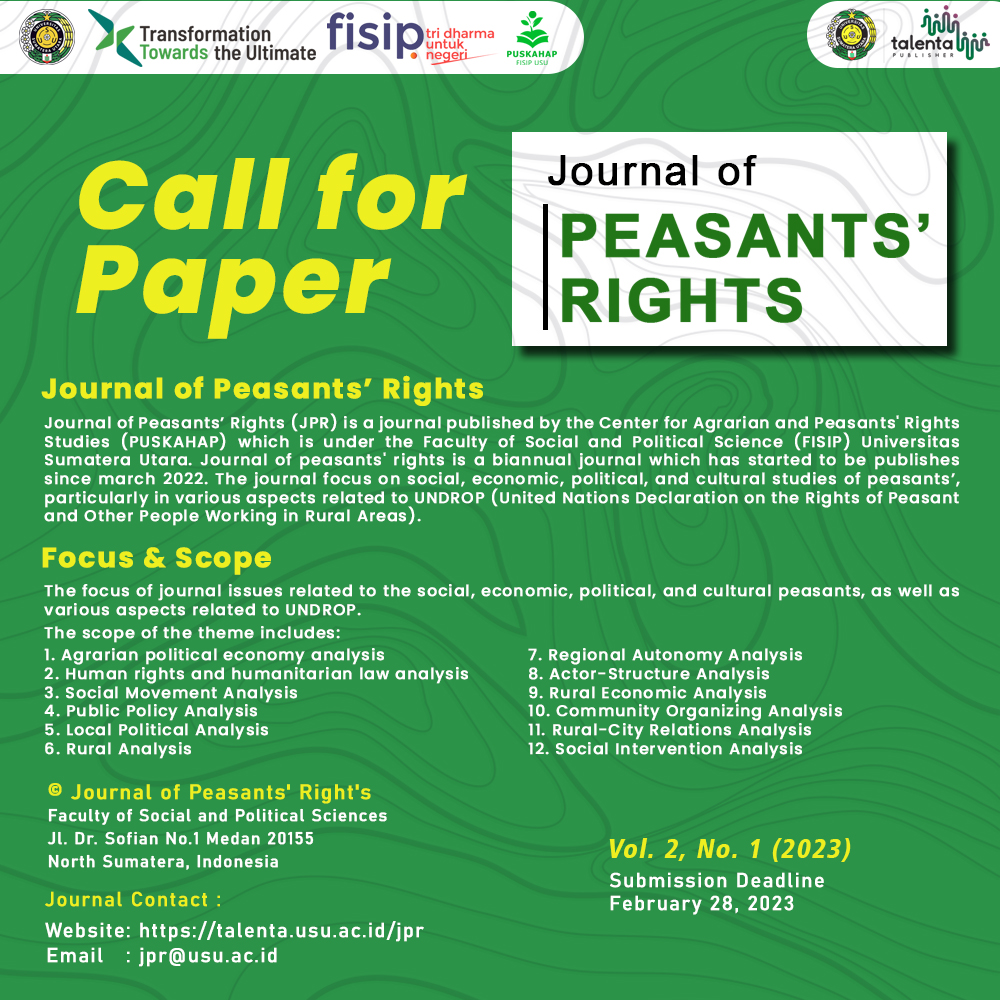INDONESIAN PEASANTS' UNION IN THE STRUGGLE OF AGRARIAN REFORM IN INDONESIA, PERIOD 1998-2011
DOI:
https://doi.org/10.32734/jpr.v1i1.8252Keywords:
Agrarian reform, Land reformAbstract
A This study discusses the struggle for Agrarian Reform carried out by the Indonesian Peasant Union in 2011. The purpose of this study is to explain the strategy of the peasant movement in fighting for agrarian reform in Indonesia. More deeply, this research will describe the strategy of the Indonesian Peasants Union (SPI) in fighting for agrarian reform. This study uses a qualitative approach, and uses a descriptive analytical method to analyze the data obtained. Data collection techniques were carried out through library research, document collection and in-depth interviews with five informants, Synthesis activists, the General Chair and members of the Indonesian Peasant Union, agrarian experts, and CNDS activists. The results of this study indicate that the SPI's agrarian struggle at the local level is carried out by prioritizing the power of the masses to occupy land and carry out mass actions. In 2011, SPI has succeeded in controlling and reclaiming 47,270 hectares of land for farmers, and hasn become productive land that supports and improves the economy of farming families. To garner support at the local level, SPI builds alliances with farmer, labor, fisherman, student and NGO organizations. At the national level, SPI's struggle was aimed at urging the state to implement Law No. 5 of 1960 concerning Basic Agrarian Regulations. The Indonesian Peasant Union's strategy to oppose oppressive power relations was carried out to deal with various forms of power in various spaces and levels.Downloads
References
Akbar, M.C. (2016). Theification of the Waning Role of States in Neoliberalism (Free Trade and Conflict Between Countries under the WTO Regime) [Teifikasi Memudarnya Peran Negara dalam Neoliberalisme (Perdagangan Bebas dan Konflik Antar Negara di Bawah Rezim WTO)]. Global Insight Journal, 1(1).
Budiman, A. (1996). Third world development theory.
Central Bureau of Statistics, March 2011. Monthly Report on Socio-Economic Data, Jakarta.
Creswell, J. W., & Poth, C. N. (2016). Qualitative inquiry and research design: Choosing among five approaches. [Penyelidikan kualitatif dan desain penelitian: Memilih di antara lima pendekatan]. Sage publications.
Fidro, B., & Fauzi, N. (1998). Fruitful Development disputes: A collection of land dispute cases throughout the New Order. [Sengketa Pembangunan yang Berbuah: Kumpulan kasus sengketa tanah sepanjang masa Orde Baru].
Gaventa, J. (1982). Power and powerlessness: Quiescence and rebellion in an Appalachian valley [Kekuasaan dan ketidakberdayaan: Keheningan dan pemberontakan di lembah Appalachian].University of Illinois Press.
Gaventa, J. (2006). Finding the spaces for change: a power analysis [Menemukan ruang untuk perubahan: analisis kekuatan]. IDS bulletin, 37(6), 23-33.
Miles, M.B., Huberman, M. & Saldana. (2014). Qualitative Data Analysis: A Methods Sourcebook [Analisis Data Kualitatif: Buku Sumber Metode.]. (H. Salmon, Ed.) (3rd ed.). London: SAGE.
Purwanto, H. (2013). Local to global; How The Indonesian Peasants Union has accelerated the movement for agrarian reform [Lokal ke global; Bagaimana Serikat Tani Indonesia mempercepat gerakan reforma agraria]. La Via Campesina's Open Book: Celebrating, 20,1-12.
Pelzer, K. J. (1991). Agrarian disputes: plantation entrepreneurs against peasants [Sengketa agraria: pengusaha perkebunan melawan petani]. Hope Light Library.
Purba, C.C.M. (2017). Indigenous Peoples Social Movement: The Study of The Seizure of Frankincense Forest Land in Pandumaan-Sipituhuta Village of Humbang Hasundutan Regency of North Sumatra [Gerakan Sosial Masyarakat Adat: Kajian Perebutan Lahan Hutan Kemenyan di Desa Panduan-Sipitu Huta Kabupaten Humbang Hasundutan Sumatera Utara]. (Doctoral dissertation, Universitas Brawijaya).
SPI., (2008.) SPI's Basic Attitude View on Agrarian Reform and Rural Development, in the Third Congress Document of the Indonesian Peasants Union [Pandangan Dasar SPI tentang Reforma Agraria dan Pembangunan Pedesaan, dalam Dokumen Kongres Ketiga Serikat Tani Indonesia]. Jakarta: Indonesian Peasants Union.
SPI., (2010). Indonesian Peasants Union, Stop The Policy of Liberalization and Corporatization of Agriculture: Record of Agricultural Development, Rural and
Agrarian Reform 2010 [Serikat Tani Indonesia, Stop Kebijakan Liberalisasi dan Korporatisasi Pertanian: Catatan Pembangunan Pertanian, Reformasi Pedesaan dan Agraria 2010].
SPI., (2012). Mesuji Case: The Tip of the Iceberg of Peasants' Rights Violations inIndonesia [Kasus Mesuji: Puncak Gunung Es Pelanggaran Hak-Hak Petani di Indonesia]. http://www.spi.or.id/?p=4555, accessed on March 13, 2012
White, B. (2019). Population, involution, and employment in rural Java [Populasi, involusi, dan lapangan kerja di pedesaan Jawa] (pp. 130-146). Routledge.
Wiradi, G. (2009). Ins and outs of agrarian problems: agrarian reform and agrarian research [Seluk-beluk masalah agraria: reforma agraria dan penelitian agraria]. SCIENCE Press.







